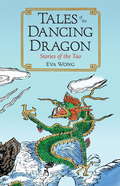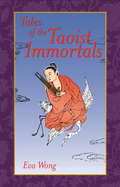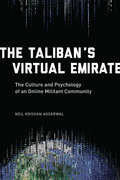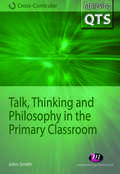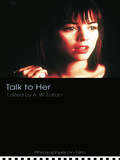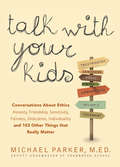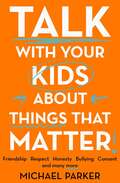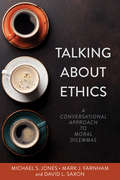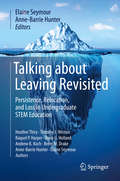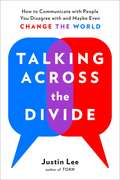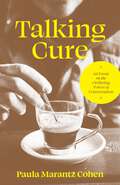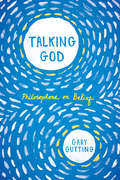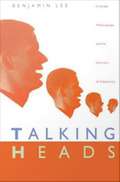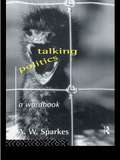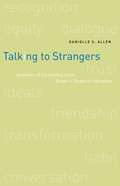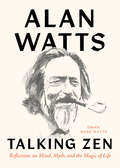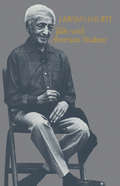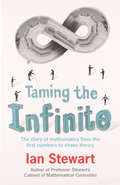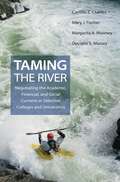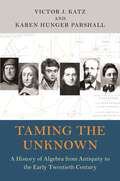- Table View
- List View
Tales of the Dancing Dragon: Stories of the Tao
by Eva WongHere, Taoist practitioner Eva Wong offers a colorful treatment of the history and evolution of Taoism, told through traditional teaching tales. These tales, which Wong first heard as a child growing up in Hong Kong, are gleaned from the local storytellers and the uncensored chronicles known as yeshi--the wild history of China, not monitored by the official imperial scholars and historians. The stories are by turns mysterious and intriguing, passionate and violent, and they are peppered with colorful characters, including hermits, politicians, social activists, revolutionaries, scholars, scientists, and mystics. Arranged chronologically from prehistory through the early twentieth century, these stories introduce the schools in the Taoist lineages, and capture the defeats and victories of Taoism, its periods of decadence and decay, and its renewal, maturation, and spiritual triumph. Wong puts these stories into context, and shows that Taoism is a dynamic spiritual tradition, constantly changing--and being influenced by--history.
Tales of the Taoist Immortals
by Eva WongAs a girl growing up in Hong Kong, Eva Wong heard and memorized many tales told to her by Hong Kong's finest professional storytellers, by actors on the radio, and by her grandmother. These popular tales of the Taoist immortals were also often dramatized in Chinese operas. The stories are of famous characters in Chinese history and myth: a hero's battle with the lords of evil, the founder of the Ming dynasty's treacherous betrayal of his friends, a young girl who saves her town by imitating rooster calls. Entertaining and often provocative, these tales usually include a moral. The immortals are role models in Chinese culture, as well as examples of enlightenment. Some of the immortals were healers, some were social activists, some were aristocrats, and some were entrepreneurs. The tales chosen by Eva Wong here are of the best-known immortals among the Chinese. Their names are household words and their stories are told and retold by one generation to the next.
The Taliban's Virtual Emirate: The Culture and Psychology of an Online Militant Community
by Neil Krishan AggarwalApplying cutting-edge psychiatric theories to an analysis of online Taliban literature in four languages, Neil Krishan Aggarwal constructs a game-changing narrative of the organization's broad appeal and worldview.Aggarwal, a cultural psychiatrist, focuses on the Taliban's creation of culture, evoking religion in Arabic and English writings, nationalism in Dari sources, and regionalism in Urdu texts. The group also promotes a specific form of argumentation, citing religious scriptures in Arabic works, canonical poets in Dari and Urdu writings, and scholars and journalists in English publications. Aggarwal shows how the Taliban categorize all Muslims as members and all non-Muslims as outsiders; how they convince Muslims of the need for violence; and how they apply the insider/outsider dichotomy to foreign policy. By understanding these themes, Aggarwal argues, we can craft better countermessaging strategies.
Talk of the Devil: Encounters with Seven Dictators
by Riccardo Orizio Avril BardoniFirst-hand accounts.
Talk, Thinking and Philosophy in the Primary Classroom (Achieving QTS Cross-Curricular Strand Series)
by John SmithTalk, thinking and philosophy are crucial components of children’s learning. This book is a practical and readable guide to the ways in which teachers can provide children with the opportunities to develop and use these skills to their greatest effect. It begins by asking why talking and thinking should be taught and examines current approaches in this area. It goes on to look at how teachers can develop talking and thinking skills across the six Areas of Learning to help children gain confidence and deepen understanding.
Talk to Her (Philosophers on Film)
by A. W. EatonPedro Almodóvar is one of the most renowned film directors of recent years. Talk to Her is one of the most discussed and controversial of all his films. Dealing principally with the issue of rape, it also offers profound insights into the nature of love and friendship whilst raising important philosophical and moral questions in unsettling and often paradoxical ways. This is the first book to explore and address the philosophical aspects of Almodóvar’s film. Opening with a helpful introduction by Noël Carroll that places the film in context, specially commissioned chapters examine the following topics: The relationship between art and morality and the problem of 'immoralism' Moral injury and its role in the way we form moral judgments, including the ethics of love and friendship The nature of dialogue, sexual objectification and what 'listening to' means in the context of gender Almodóvar's use of allusion and the unmasking of appearances to explore hidden themes in human nature. Including a biography of Almodóvar, Talk to Her is essential reading for students interested in philosophy and film as well as ethics and gender. It is also provides an accessible and informative insight into philosophy for those in related disciplines such as film studies, literature and religion. Contributors: Noël Carroll, A. W. Eaton, Cynthia Freeland, Robert B. Pippin, C.D.C. Reeve, and George M. Wilson
Talk With Your Kids: Conversations About Ethics -- Honesty, Friendship, Sensitivity, Fairness, Dedication, Individuality -- and 103 Other Things That Really Matter
by Michael ParkerA guide for parents to help their children better understand the world around them by helping them think through the questions they face regarding honesty, friendship, sensitivity, fairness, dedication, individuality and 103 other character-building issuesMany families and almost all schools spend a great deal of time developing children academically, but studies show tht scholastic achievement is not the only key to future success. Developing non-cognitive skills, which children often learn from their parents, is equally relevant.Talk with Your Kids prompts thoughtful and effective discussion between parents and children by posing 109 open-ended questions. Many of the questions reflect situations immediately relevant to kids, such as cyber-bullying, cheating in school or in sports, accepting differences, illegal music downloads, what defines lying, and making choices about drugs and sex.Other questions ask kids to consider larger dilemmas, such as medical ethics and medical testing, declaring war, crime and punishment, eating meat, and more. Parker also offers suggestions to parents on how to keep the conversations going and encourage kids to think more deeply about an issue. Throughout the book are questions based on the theories of famous ethicists and philosophers, including John Stuart Mill, Immanuel Kant, Thomas Hobbes, and Jean Jacques Rousseau.Best-selling parenting books such as How Children Succeed and Nurtureshock emphasize the importance of strong values in a child. The conversations in Talk with Your Kids help parents achieve this goal.
Talk With Your Kids About Things That Matter: A must have guide to consent, bullying, fake news and more
by Michael ParkerWhat makes a person good? Is it their impeccable table manners? Whether they participate in protests? The way they treat the waiter?Talk to Your Kids About Things That Matter is the go-to guide for navigating ethics in the 21st century. In a post-Trump, post-truth world, the lines between right and wrong are increasingly blurred and ethics matter more than ever. More of us are questioning the world that we live in and what is our role inside it. Inside this book you&’ll find over 100 conversation starters for creating meaningful, thought-provoking discussions. From Plato to veganism, cancel culture to consent, and politics to basic kindness, these topics are set to engage, inspire, and even divide. It&’s the perfect accompaniment for road trips, Sunday afternoon drinks, family dinners or even a first date. Designed to have no real answer, but rather, stir even more questions, this provocative and deeply engaging book will kick your philosophical gears into action. How to be a Good Human encourages readers to dig deeper, put yourself in others&’ shoes, and be the best human you can be.
Talking About Ethics: A Conversational Approach to Moral Dilemmas
by Michael S. Jones Mark J. Farnham David L. SaxonAn accessible introduction to ethics through engaging dialoguesTalking About Ethics provides the reader with all of the tools necessary to develop a coherent approach to ethical decision making. Using the tools of ethical theory, the authors show how these theories play out in relation to a wide variety of ethical questions using an accessible dialogue format. The chapters follow three college students as they discuss today’s most important ethical issues with their families and friends, including:• Immigration• Capital punishment• Legalization of narcotics• Abortion• Premarital sex• Reproductive technologies• Gender identity• The environment, and many moreThe engaging dialogue format illustrates how these topics often take shape in the real world, and model critical thinking and Christian ethical decision making. Study aids in each chapter include overviews, sidebars, reflection questions, glossaries, and recommended reading. Ideal as a textbook for undergraduate ethics courses, it is also accessible enough for high school classes and personal study.
Talking about Leaving Revisited: Persistence, Relocation, and Loss in Undergraduate STEM Education
by Heather Thiry Timothy J. Weston Raquel P. Harper Dana G. Holland Andrew K. Koch Brent M. DrakeTalking about Leaving Revisited discusses findings from a five-year study that explores the extent, nature, and contributory causes of field-switching both from and among “STEM” majors, and what enables persistence to graduation. The book reflects on what has and has not changed since publication of Talking about Leaving: Why Undergraduates Leave the Sciences (Elaine Seymour & Nancy M. Hewitt, Westview Press, 1997). With the editors’ guidance, the authors of each chapter collaborate to address key questions, drawing on findings from each related study source: national and institutional data, interviews with faculty and students, structured observations and student assessments of teaching methods in STEM gateway courses. Pitched to a wide audience, engaging in style, and richly illustrated in the interviewees’ own words, this book affords the most comprehensive explanatory account to date of persistence, relocation and loss in undergraduate sciences.Comprehensively addresses the causes of loss from undergraduate STEM majors—an issue of ongoing national concern.Presents critical research relevant for nationwide STEM education reform efforts.Explores the reasons why talented undergraduates abandon STEM majors.Dispels popular causal myths about why students choose to leave STEM majors.This volume is based upon work supported by the Alfred P. Sloan Foundation Award No. 2012-6-05 and the National Science Foundation Award No. DUE 1224637.
Talking About Right and Wrong
by Cecilia Wainryb Holly E. RecchiaThough it is generally acknowledged that parents are directly implicated in how and what their children learn about right and wrong, little is known about how the process of moral socialization proceeds in the context of family life, and how it gets played out in actual parent-child conversations. This volume brings together psychological research conducted in different countries documenting how parents and their children of different ages talk about everyday issues that bear on right and wrong. More than 150 excerpts from real parent-child conversations about children's own good and bad behaviors and about broader ethical concerns that interest both parents and children, such as global warming or gender equality, provide a unique window into the moral-socialization process in action. Talking about Right and Wrong also underscores distinct psychological and sociocultural processes that explain how such everyday conversations may further, or hinder, children's moral development.
Talking Across the Divide: How to Communicate with People You Disagree with and Maybe Even Change the World
by Justin LeeA guide to learning how to communicate with people who have diametrically opposed opinions from you, how to empathize with them, and how to (possibly) change their mindsAmerica is more polarized than ever. Whether the issue is Donald Trump, healthcare, abortion, gun control, breastfeeding, or even DC vs Marvel, it feels like you can't voice an opinion without ruffling someone's feathers. In today's digital age, it's easier than ever to build walls around yourself. You fill up your Twitter feed with voices that are angry about the same issues and believe as you believe. Before long, you're isolated in your own personalized echo chamber. And if you ever encounter someone outside of your bubble, you don't understand how the arguments that resonate so well with your peers can't get through to anyone else. In a time when every conversation quickly becomes a battlefield, it's up to us to learn how to talk to each other again. In Talking Across the Divide, social justice activist Justin Lee explains how to break through the five key barriers that make people resist differing opinions. With a combination of psychological research, pop-culture references, and anecdotes from Justin's many years of experience mediating contentious conversations, this book will help you understand people on the other side of the argument and give you the tools you need to change their minds--even if they've fallen for "fake news."
Talking Cure: An Essay on the Civilizing Power of Conversation
by Paula Marantz CohenAn invigorating exploration of the pleasures and social benefits of conversationTalking Cure is a timely and enticing excursion into the art of good conversation. Paula Marantz Cohen reveals how conversation connects us in ways that social media never can and explains why simply talking to each other freely and without guile may be the cure to what ails our troubled society.Drawing on her lifelong immersion in literature and culture and her decades of experience as a teacher and critic, Cohen argues that we learn to converse in our families and then carry that knowledge into a broader world where we encounter diverse opinions and sensibilities. She discusses the role of food in encouraging conversation, the challenges of writing dialogue in fiction, the pros and cons of Zoom, the relationship of conversation to vaudeville acts, and the educational value of a good college seminar where students learn to talk about ideas. Cohen looks at some of the famous groups of writers and artists in history whose conversation fed their creativity, and details some of the habits that can result in bad conversation.Blending the immediacy of a beautifully crafted memoir with the conviviality of an intimate gathering with friends, Talking Cure makes a persuasive case for the civilizing value of conversation and is essential reading for anyone interested in the chatter that fuels culture.
Talking God: Philosophers on Belief
by Gary GuttingThrough interviews with twelve distinguished philosophers—including atheists, agnostics, and believers—Talking God works toward a philosophical understanding and evaluation of religion. Along the way, Gary Gutting and his interviewees challenge many common assumptions about religious beliefs. As tensions simmer, and often explode, between the secular and the religious forces in modern life, the big questions about human belief press ever more urgently. Where does belief, or its lack, originate? How can we understand and appreciate religious traditions different from our own? Featuring conversations with twelve skeptics, atheists, agnostics, and believers—including Alvin Plantinga, Philip Kitcher, Michael Ruse, and John Caputo—Talking God offers new perspectives on religion, including the challenge to believers from evolution, cutting-edge physics and cosmology; arguments both for and against atheism; and meditations on the value of secular humanism and faith in the modern world. Experts offer insights on Islam, Buddhism, and Hinduism, as well as Judaism and Christianity. Topical and illuminating, Talking God gives readers a deeper understanding of faith today and how philosophers understand it. From Talking God: “[Some say] Buddhism is not a religion because Buddhists don’t believe in a supreme being. This simply ignores the fact that many religions are not theistic in this sense. Chess is a game, despite the fact that it is not played with a ball, after all.”—Jay Garfield, from chapter 10, “Buddhism: Religion Without Divinity” “Why think that the creator was all-knowing and omnipotent?— Maybe the creator was a student god, and only got a B minus on this project?”—Louise Antony, from chapter 2, “A Case for Atheism” “There are a large number—maybe a couple of dozen—of pretty good theistic arguments. None is conclusive, but each, or at any rate the whole bunch taken together, is about as strong as philosophical arguments ordinarily get.”—Alvin Plantinga, from chapter 1, “A Case for Theism” “If you cease to ‘believe’ in a particular religious creed, like Calvinism or Catholicism, you have changed your mind and adopted a new position— But if you lose ‘faith,’—everything is lost. You have lost your faith in life, lost hope in the future, lost heart, and you cannot go on.”—John Caputo, from chapter 3, “Religion and Deconstruction”
Talking Heads: Language, Metalanguage, and the Semiotics of Subjectivity
by Benjamin LeeIn Talking Heads, Benjamin Lee situates himself at the convergence of multiple disciplines: philosophy, linguistics, anthropology, and literary theory. He offers a nuanced exploration of the central questions shared by these disciplines during the modern era--questions regarding the relations between language, subjectivity, community, and the external world. Scholars in each discipline approach these questions from significantly different angles; in seeking to identify and define the intersection of these angles, Lee argues for the development of a new sense of subjectivity, a construct that has repercussions of immense importance beyond the humanities and into the area of politics. Talking Heads synthesizes the views and works of a breathtaking range of the most influential modern theorists of the humanities and social sciences, including Austin, Searle, Derrida, Jakobson, Bakhtin, Wittgenstein, Peirce, Frege, Kripke, Donnellan, Putnam, Saussure, and Whorf. After illuminating these many strands of thought, Lee moves beyond disciplinary biases and re-embeds within the context of the public sphere the questions of subjectivity and language raised by these theorists. In his examination of how subjectivity relates not just to grammatical patterns but also to the specific social institutions in which these patterns develop and are sustained, Lee discusses such topics as the concept of public opinion and the emergence of Western nation-states.
Talking Politics: A Wordbook
by A. W. SparkesTalking Politics is a philosophical examination of some of the basic concepts of political discourse. Its primary focus is on the ordinary; on what is said by politicians, in newspapers and by people in pubs, rather than on the works of political theorists. This is a work of, but not on political theory.Talking Politics is:* Invaluable as a source of reference for students, and contains a detailed index* Arranged thematically, around topics such as `Nation'. Each entry has copious cross-references and suggestions for further readingA. W. Sparkes is uniquely qualified to write such a book, combining some thirty years' teaching as a philosopher with wide experience of, and a life-long fascination with, politics. His attitude is that of a critical, but uncynical, observer.
Talking to Strangers: Anxieties of Citizenship since Brown v. Board of Education
by Danielle S. Allen"Don't talk to strangers" is the advice long given to children by parents of all classes and races. Today it has blossomed into a fundamental precept of civic education, reflecting interracial distrust, personal and political alienation, and a profound suspicion of others. In this powerful and eloquent essay, Danielle Allen, a 2002 MacArthur Fellow, takes this maxim back to Little Rock, rooting out the seeds of distrust to replace them with "a citizenship of political friendship. "Returning to the landmark Brown v. Board of Education decision of 1954 and to the famous photograph of Elizabeth Eckford, one of the Little Rock Nine, being cursed by fellow "citizen" Hazel Bryan, Allen argues that we have yet to complete the transition to political friendship that this moment offered. By combining brief readings of philosophers and political theorists with personal reflections on race politics in Chicago, Allen proposes strikingly practical techniques of citizenship. These tools of political friendship, Allen contends, can help us become more trustworthy to others and overcome the fossilized distrust among us. Sacrifice is the key concept that bridges citizenship and trust, according to Allen. She uncovers the ordinary, daily sacrifices citizens make to keep democracy working and offers methods for recognizing and reciprocating those sacrifices. Trenchant, incisive, and ultimately hopeful, Talking to Strangers is nothing less than a manifesto for a revitalized democratic citizenry.
Talking Zen
by Alan WattsInsightful and entertaining essays spanning 40 years of lectures by Alan Watts on Zen, Taoism, psychedelics, and comparative philosophy.Alan Watts's essays and talks range widely through psychology, art, religion, and politics, but always come home to the Zen core. For those familiar with Alan Watts&’s style of presentation, the wonderful, memorable, and prophetic style of his voice is captured in this volume. Talking Zen puts on display Watts&’s ability to explore the very subtle philosophies, those common across traditions and those unique to Zen, in ordinary and accessible language. These lectures paved the way for the rise of Zen in the West.
Talks with American Students
by J. KrishnamurtiIn 1968—a time when young Americans were intensely questioning the values of their society—Krishnamurti gave a series of talks to college students in the United States and Puerto Rico, exploring the true meaning of freedom and rebellion. Collected in this book, these lectures are perhaps even more compelling today, when both adults and young people are searching for the key to genuine change in our world.
The Taming of Chance
by Ian HackingIn this important new study Ian Hacking continues the enquiry into the origins and development of certain characteristic modes of contemporary thought undertaken in such previous works as his best selling Emergence of Probability. Professor Hacking shows how by the late nineteenth century it became possible to think of statistical patterns as explanatory in themselves, and to regard the world as not necessarily deterministic in character. Combining detailed scientific historical research with characteristic philosophic breath and verve, The Taming of Chance brings out the relations among philosophy, the physical sciences, mathematics and the development of social institutions, and provides a unique and authoritative analysis of the "probabilization" of the Western world.
Taming the Imperial Imagination
by Martin J. BaylyTaming the Imperial Imagination marks a novel intervention into the debate on empire and international relations, and offers a new perspective on nineteenth-century Anglo-Afghan relations. Martin J. Bayly shows how, throughout the nineteenth century, the British Empire in India sought to understand and control its peripheries through the use of colonial knowledge. Addressing the fundamental question of what Afghanistan itself meant to the British at the time, he draws on extensive archival research to show how knowledge of Afghanistan was built, refined and warped by an evolving colonial state. This knowledge informed policy choices and cast Afghanistan in a separate legal and normative universe. Beginning with the disorganised exploits of nineteenth-century explorers and ending with the cold strategic logic of the militarised 'scientific frontier', this book tracks the nineteenth-century origins of contemporary policy 'expertise' and the forms of knowledge that inform interventions in Iraq, Afghanistan and elsewhere today.
Taming the Infinite
by Ian StewartFrom ancient Babylon to the last great unsolved problems, Ian Stewart brings us his definitive history of mathematics. In his famous straightforward style, Professor Stewart explains each major development--from the first number systems to chaos theory--and considers how each affected society and changed everyday life forever.Maintaining a personal touch, he introduces all of the outstanding mathematicians of history, from the key Babylonians, Greeks and Egyptians, via Newton and Descartes, to Fermat, Babbage and Godel, and demystifies math's key concepts without recourse to complicated formulae. Written to provide a captivating historic narrative for the non-mathematician, Taming the Infinite is packed with fascinating nuggets and quirky asides, and contains 100 illustrations and diagrams to illuminate and aid understanding of a subject many dread, but which has made our world what it is today.
Taming the Leviathan
by Jon ParkinThomas Hobbes is widely acknowledged as the most important political philosopher to have written in English. Originally published in 2007, Taming the Leviathan is a wide-ranging study of the English reception of Hobbes's ideas. In the first book-length treatment of the topic for over forty years, Jon Parkin follows the fate of Hobbes's texts (particularly Leviathan) and the development of his controversial reputation during the seventeenth century, revealing the stakes in the critical discussion of the philosopher and his ideas. Revising the traditional view that Hobbes was simply rejected by his contemporaries, Parkin demonstrates that Hobbes's work was too useful for them to ignore, but too radical to leave unchallenged. His texts therefore had to be controlled, their lessons absorbed and their author discredited. In other words the Leviathan had to be tamed. Taming the Leviathan significantly revised our understanding of the role of Hobbes and Hobbism in seventeenth-century England.
Taming the River: Negotiating the Academic, Financial, and Social Currents in Selective Colleges and Universities (The William G. Bowen Series #51)
by Camille Z. Charles Mary J. Fischer Margarita A. Mooney Douglas S. MasseyBuilding on their important findings in The Source of the River, the authors now probe even more deeply into minority underachievement at the college level. Taming the River examines the academic and social dynamics of different ethnic groups during the first two years of college. Focusing on racial differences in academic performance, the book identifies the causes of students' divergent grades and levels of personal satisfaction with their institutions. Using survey data collected from twenty-eight selective colleges and universities, Taming the River considers all facets of student life, including who students date, what fields they major in, which sports they play, and how they perceive their own social and economic backgrounds. The book explores how black and Latino students experience pressures stemming from campus racial climate and "stereotype threat"--when students underperform because of anxieties tied to existing negative stereotypes. Describing the relationship between grade performance and stereotype threat, the book shows how this link is reinforced by institutional practices of affirmative action. The authors also indicate that when certain variables are controlled, minority students earn the same grades, express the same college satisfaction, and remain in school at the same rates as white students. A powerful look at how educational policies unfold in America's universities, Taming the River sheds light on the social and racial factors influencing student success.
Taming the Unknown: A History of Algebra from Antiquity to the Early Twentieth Century
by Victor J. Katz Karen Hunger ParshallWhat is algebra? For some, it is an abstract language of x's and y’s. For mathematics majors and professional mathematicians, it is a world of axiomatically defined constructs like groups, rings, and fields. Taming the Unknown considers how these two seemingly different types of algebra evolved and how they relate. Victor Katz and Karen Parshall explore the history of algebra, from its roots in the ancient civilizations of Egypt, Mesopotamia, Greece, China, and India, through its development in the medieval Islamic world and medieval and early modern Europe, to its modern form in the early twentieth century.Defining algebra originally as a collection of techniques for determining unknowns, the authors trace the development of these techniques from geometric beginnings in ancient Egypt and Mesopotamia and classical Greece. They show how similar problems were tackled in Alexandrian Greece, in China, and in India, then look at how medieval Islamic scholars shifted to an algorithmic stage, which was further developed by medieval and early modern European mathematicians. With the introduction of a flexible and operative symbolism in the sixteenth and seventeenth centuries, algebra entered into a dynamic period characterized by the analytic geometry that could evaluate curves represented by equations in two variables, thereby solving problems in the physics of motion. This new symbolism freed mathematicians to study equations of degrees higher than two and three, ultimately leading to the present abstract era.Taming the Unknown follows algebra’s remarkable growth through different epochs around the globe.
